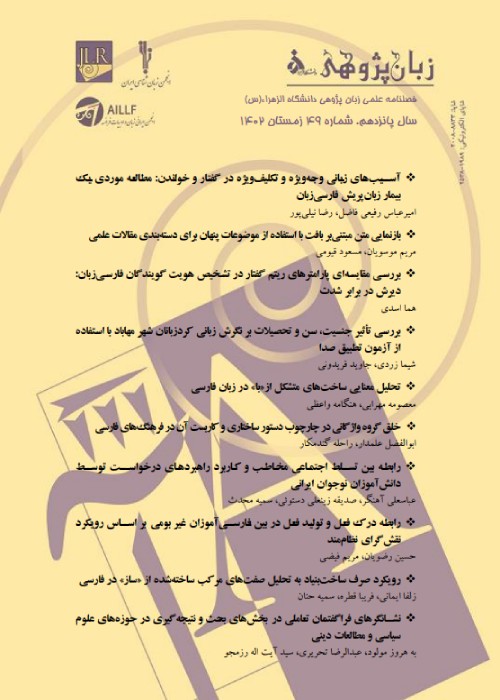Double Nature of Metaphorical Conceptualization of Love in Persian: A Cognitive Approach
Author(s):
Article Type:
Research/Original Article (دارای رتبه معتبر)
Abstract:
This article aims to conduct a cognitive corpus-based study on the double nature in metaphorical conceptualization of “Love” in two metaphorical systems of emotions and human relationships in Persian language. In doing so, 15 Persian novels were selected from Institute for Humanities and Cultural Studies' Persian Language Data Base (PLDB). To choose love-related keywords for being looked up in the corpus, Shahid Beheshti University's FarsNet (a Persian WordNet) was used as well as a Persian thesaurus. After listing the word family of “Love”, three more frequent synonyms of “Love” were used to be looked up in the corpus, and 62 source domains for metaphorical conceptualization of “Love” were detected. To compare these source domains with the source domains of human relationships, “Marriage”, as a prototype of human relationships was searched in the PLDB. Studying metaphorical expressions showed that 26 source domains existed for metaphorical conceptualization of “Marriage’. Comparing the source domains of “Love” and “Marriage” showed that three human-relationship-specific source domains of “Bond”, “War” and “Contract”, among others, were the common source domains for metaphorical conceptualization of both “Love” and “Marriage”. This confirms the double-nature of “Love” in Persian. Finally, these common source domains were compared with the source domains of basic emotions of “Anger” and “Happiness” and there happened to be no common source domain between “Love” and these two emotions, resulting in “Love” being probably the only emotion with a double nature. This research has the Conceptual Theory of Metaphor, first suggested by Lakoff and Johnson in their book, Metaphors We Live By (1980), as its theoretical framework. According to this theory, metaphor is understanding an abstract concept with another concrete one. Emotions are very extensive human experiences, and since human cognition can affect emotions, linguistic study of emotions can contribute to a better grasp of human cognition. In this article, the source domains of “Love” and “Marriage” are presented separately. Then, the common source domains between the two are listed. We will see that the three source domains of “Bond”, “War” and “Contract”, the specific human relationship source domains, are common source domains between “Love” and “Marriage”, confirming the double nature of “Love.” In the present study, to find the conceptual metaphors of “Love”, three love-related words were searched in the corpus. Then, the relevant sentences were investigated one by one, and the expressions in which “Love” had been metaphorically conceptualized were studied, and 63 source domains were listed. The same was done for metaphorical conceptualization of “Marriage” and 26 source domains were found. While usually intuition is used to determine the source domains in linguistic metaphor studies, this study, for the first time in cognitive studies of metaphor in Persian language, used the corpus itself to determine the source domains rather than the intuition. The reason is that more often than not; linguists do not agree with each other in terms of which source domains represent which target domains. So, when a source domain could not be determined easily, instead of referring to intuition, the collocations of that word were looked up in the corpus, and the most frequent concrete concept was chosen as the source domain. Then, the two lists of source domains were compared, showing 18 common source domains. From among these common source domains, three source domains of “Bond”, “War” and “Contract” showed meaningful correspondence to “Love” source domains. By 'meaningful', we mean the source domains that can prove the double nature of “Love” because comparing metaphorical conceptualization of every two concepts is likely to show such correspondences. However, “Bond”, “War” and “Contract” are specific source domains of human relationships as they cannot exist without two active sides. To make sure that these three source domains are specific to “Love”, not other emotions, they were cross-checked with the findings of two studies on metaphorical conceptualization of “Anger” and “Happiness”. Lack of any commonality between the meaningful source domains of “Love” and the source domains of “Anger” and “Happiness” proves that this double nature is specific to “Love” and not any other emotion. This article showed that in Persian, like English, “Love” has a double nature in terms of metaphorical conceptualization in that it shows the characteristics of emotions and human relationships at the same time. The novel usage of corpus in this study was done for the first time in Persian language studies of metaphor. Findings of this kind help researchers get closer to the relationship between different metaphorical systems which in turn facilitates our knowledge of how metaphors are produced and perceived in human languages.
Keywords:
Language:
Persian
Published:
Language research, Volume:12 Issue: 36, 2020
Pages:
309 to 331
https://magiran.com/p2207441
دانلود و مطالعه متن این مقاله با یکی از روشهای زیر امکان پذیر است:
اشتراک شخصی
با عضویت و پرداخت آنلاین حق اشتراک یکساله به مبلغ 1,390,000ريال میتوانید 70 عنوان مطلب دانلود کنید!
اشتراک سازمانی
به کتابخانه دانشگاه یا محل کار خود پیشنهاد کنید تا اشتراک سازمانی این پایگاه را برای دسترسی نامحدود همه کاربران به متن مطالب تهیه نمایند!
توجه!
- حق عضویت دریافتی صرف حمایت از نشریات عضو و نگهداری، تکمیل و توسعه مگیران میشود.
- پرداخت حق اشتراک و دانلود مقالات اجازه بازنشر آن در سایر رسانههای چاپی و دیجیتال را به کاربر نمیدهد.
In order to view content subscription is required
Personal subscription
Subscribe magiran.com for 70 € euros via PayPal and download 70 articles during a year.
Organization subscription
Please contact us to subscribe your university or library for unlimited access!


